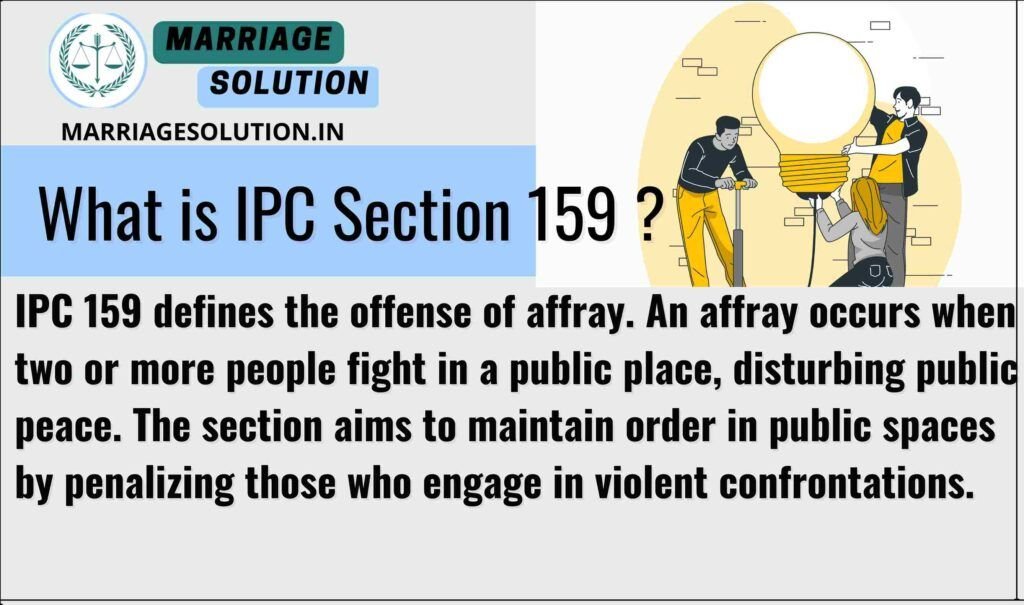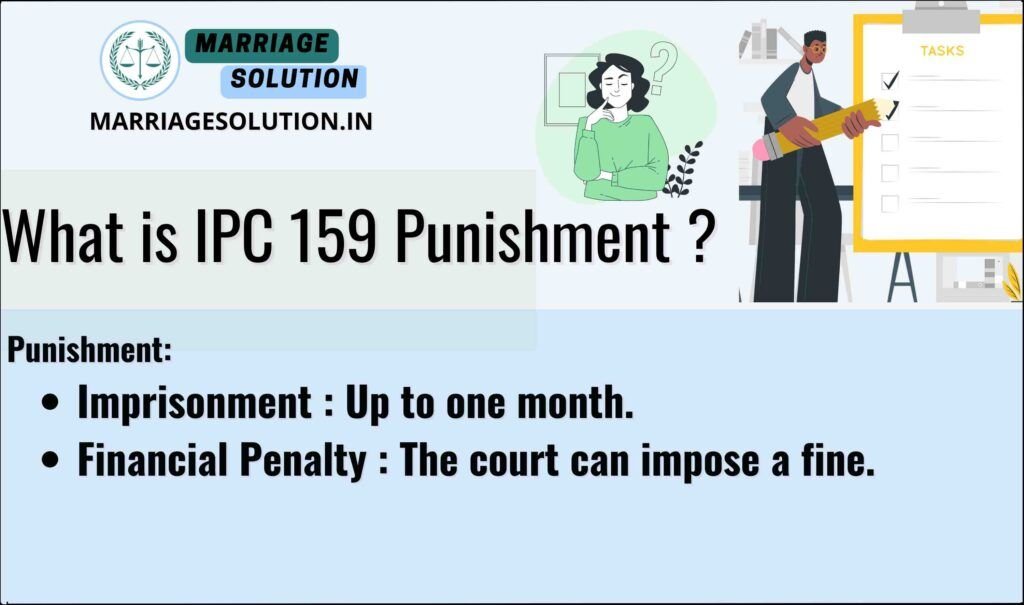Introduction of IPC 159
IPC Section 159 defines affray as a public fight between two or more people that disturbs public peace. If a fight happens in a public place and causes fear or disturbance among others, it is considered affray under this section. However, if the fight takes place in a private area, it does not come under IPC 159.
- Introduction of IPC 159
- What is IPC Section 159 ?
- IPC Section 159 Overview
- IPC 159 – Key Points Explained in Detail
- Examples of IPC 159
- 159 of IPC Punishment
- 159 IPC bailable or not ?
- Section 159 IPC case laws
- Section 159 IPC in short information
- 159 IPC FAQs
- If you need support with court proceedings or any other legal matters, don’t hesitate to reach out for assistance.
What is IPC Section 159 ?
IPC 159 defines the offense of affray. An affray occurs when two or more people fight in a public place, disturbing public peace. The section aims to maintain order in public spaces by penalizing those who engage in violent confrontations.

Section 159 IPC in Simple Points
1. Meaning of Affray
Affray means a public fight between two or more people that causes public disturbance. The fight must happen in a public place where others feel scared or disturbed. If the fight happens in a private place, it is not considered affray under IPC 159.
2. Public Disturbance is Necessary
For a fight to be an affray, it must disturb public peace. A small argument is not affray, but if the fight causes fear or panic among the public, it is punishable. Shouting or verbal abuse alone is not affray unless it leads to a physical fight in public.
3. Minimum Two People Required
Affray always involves at least two people actively fighting. If only one person is aggressive, but the other does not fight back, it does not count as affray. If a large group is fighting, all participants can be punished under IPC 159.
4. Linked with IPC 160
IPC 159 defines affray, but punishment is given under IPC 160. If found guilty, a person can face jail for up to one month, a fine of ₹100, or both. The punishment depends on the level of violence and its effect on public peace.
5. Common Examples of Affray
Street fights, brawls in markets, railway stations, or parks, and physical altercations in public events are common examples. Even a minor fight in a public place can be an affray if it disturbs others or creates fear.
IPC Section 159 Overview
IPC 159 explains affray as a situation where two or more people fight in a public place, creating fear and disturbance. This law aims to maintain peace and public order by punishing those who engage in public brawls or street fights. If the fight happens in a private space, it is not affray under IPC 159.
IPC 159 – Key Points Explained in Detail
1. Definition of Affray
Affray is defined as a public fight between two or more people that causes disturbance to public peace. If a fight happens in a private place, it is not considered affray under IPC 159. The main focus of this law is to prevent public disorder.
2. Public Disturbance is Necessary
For a fight to be considered affray, it must happen in a public place and create fear or panic among the public. A fight in a deserted area where no one is disturbed is not an affray under this law.
3. Minimum Two People Must Be Involved
Affray requires at least two individuals actively fighting. If one person attacks another who does not retaliate, it is not affray, but it may be considered assault or another offense under the IPC.
4. Location Matters
Affray can only happen in a public place such as a street, park, market, or railway station. If a fight occurs inside a private home or office, it cannot be considered affray under IPC 159.
5. Examples of Affray
Common examples include:
- A street fight between two groups that creates panic.
- A brawl in a public park that disturbs families and children.
- A violent argument in a railway station that leads to physical altercations.
6. Link to Other Offenses
An affray may also include assault, unlawful assembly, or property damage. If the fight results in serious injury or harm, the accused can be charged under multiple IPC sections.
7. Punishment for Affray
Under IPC 160, a person found guilty of affray can be:
- Jailed for up to one month, OR
- Fined up to ₹100, OR
- Both imprisonment and fine, depending on the case.
8. Bailable Offense
Affray is a bailable offense, meaning the accused can apply for bail and avoid staying in jail while awaiting trial. This makes it a less severe offense compared to more serious violent crimes.
9. Non-Cognizable Offense
Since affray is a non-cognizable offense, police cannot arrest the accused without the court’s permission. A complaint must be filed, and the Magistrate will decide the case.
10. Trial by Magistrate
Cases under IPC 159 are handled in a Magistrate’s Court, where the judge examines the severity of the fight and decides the punishment accordingly. Since affray is a minor offense, it does not go to higher courts unless linked with other serious crimes.
Examples of IPC 159
Example 1: Street Fight
Two groups get into a fight on a busy road, throwing stones and shouting at each other. People nearby get scared and run away. This is an affray because it disturbs public peace.
Example 2: Market Brawl
Two vendors in a crowded market start fighting over a customer, and their fight turns violent. The public gets involved, and shopkeepers panic. This is an affray because it disturbs the normal functioning of the market.
159 of IPC Punishment
Imprisonment : Up to one month.
Financial Penalty : The court can impose a fine.

159 IPC bailable or not ?
IPC 159 is a bailable offense. This means if someone is arrested under this section, they can usually get bail. The police or court can grant bail, often without needing to go before a judge. However, bail might come with conditions like regularly reporting to the police station. The court can still refuse bail if they think the person might run away or cause more trouble.
Section 159 IPC case laws
1. State of Gujarat v. Mukesh Patel (1980)
- Summary: Involved in a public fight at a market.
- Details: Eyewitnesses and police reports were key evidence.
- Verdict: Guilty under IPC 159.
- Significance: Highlighted the importance of maintaining public peace.
2. State of Maharashtra v. Rahul Sharma (1985)
- Summary: Brawl at a public event.
- Details: Video evidence and testimonies were critical.
- Verdict: Guilty under IPC 159.
- Significance: Emphasized the role of clear evidence in convictions.
3. State of Rajasthan v. Manoj Yadav (1990)
- Summary: Street fight causing public disturbance.
- Details: Police intervention and witness statements were used.
- Verdict: Guilty under IPC 159.
- Significance: Reinforced the legal consequences of public fights.
4. State of Punjab v. Harpreet Singh (1995)
- Summary: Fight at a public park.
- Details: Statements from bystanders and police officers.
- Verdict: Guilty under IPC 159.
- Significance: Stressed the impact of fights in public places.
5. State of Haryana v. Suresh Kumar (2000)
- Summary: Altercation in a public transport.
- Details: Testimonies from passengers and the driver.
- Verdict: Guilty under IPC 159.
- Significance: Highlighted the importance of public safety.
6. State of Uttar Pradesh v. Ramesh Tiwari (2005)
- Summary: Fight outside a shopping complex.
- Details: CCTV footage and eyewitness accounts.
- Verdict: Guilty under IPC 159.
- Significance: Showed the role of modern technology in evidence.
7. State of Bihar v. Anil Kumar (2010)
- Summary: Clash during a public demonstration.
- Details: Media footage and participant statements.
- Verdict: Guilty under IPC 159.
- Significance: Emphasized maintaining order during public gatherings.
8. State of Karnataka v. Rajesh Singh (2015)
- Summary: Public brawl at a festival.
- Details: Witness testimonies and police reports.
- Verdict: Guilty under IPC 159.
- Significance: Reinforced the need for public decorum.
9. State of Tamil Nadu v. Karthik Raj (2018)
- Summary: Fight in a public playground.
- Details: Statements from children and parents present.
- Verdict: Guilty under IPC 159.
- Significance: Highlighted the importance of public peace in community areas.
10. State of Andhra Pradesh v. Srinivas Rao (2020)
- Summary: Violent altercation in a public square.
- Details: Eyewitness accounts and police records.
- Verdict: Guilty under IPC 159.
- Significance: Showed the consequences of disrupting public peace.
Section 159 IPC in short information
| IPC Section | Offense | Punishment | Bailable/Non-Bailable | Cognizable/Non-Cognizable | Trial By |
|---|---|---|---|---|---|
| IPC 159 | Engaging in a public fight that disturbs peace | Up to 1 month in jail, ₹100 fine, or both | Bailable | Non-Cognizable | Magistrate |
159 IPC FAQs
What constitutes an affray under IPC 159?
An affray involves a public fight between two or more people that causes a disturbance to public peace.
Can a private fight be considered an affray?
No, a fight must occur in a public place and disturb public peace to be considered an affray.
Is the number of participants important in an affray?
Yes, at least two people must be involved in the fight for it to be considered an affray.
Are there any exceptions to IPC 159?
There are no specific exceptions; however, each case is judged based on its own facts and circumstances.
If you need support with court proceedings or any other legal matters, don’t hesitate to reach out for assistance.
Court or any other marriage-related issues, our https://marriagesolution.in/lawyer-help-1/ website may prove helpful. By completing our enquiry form and submitting it online, we can provide customized guidance to navigate through the process effectively. Don’t hesitate to contact us for personalized solutions; we are here to assist you whenever necessary!
Right to Information RTI act :Your Comprehensive Guide (Part 1)
The Right to Information (RTI) Act : Explore the essence of the Right to Information (RTI) Act through this symbolic image. The image features legal documents, emphasizing the importance of transparency and accountability in governance. The scales of justice represent…
What is Article 371 of Indian Constitution ?
Article 371 of the Indian Constitution grants special provisions to specific states and regions within India, addressing their unique historical, social, and cultural circumstances. These provisions aim to accommodate diverse needs and protect cultural identities within the constitutional framework.
Indian Labour law : Your Comprehensive Guide (Part 1)
The purpose of labour laws is to safeguard employees and guarantee equitable treatment at the workplace, encompassing aspects such as remuneration, security, and perks. These regulations establish a secure ambiance by imposing minimum wage requirements, ensuring factory safety measures are…
GST :Your Comprehensive Guide (Part 1 – Understanding the Basics)
The Goods and Services Tax (GST) is like a big change in how we pay taxes in India. It started on July 1, 2017, and it’s here to simplify things. Before GST, we had many different taxes, and it could…





